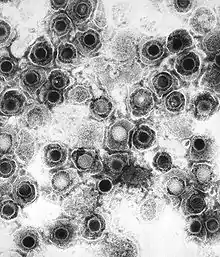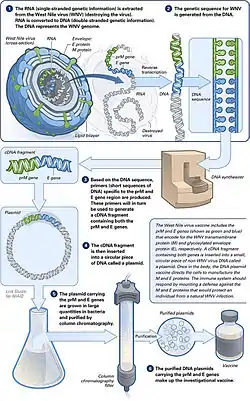Akiko Iwasaki
Akiko Iwasaki (岩崎明子, Iwasaki Akiko, born September 13, 1970) is the Waldemar Von Zedtwitz Professor in the Department of Immunobiology and a Professor in the Department of Molecular, Cellular, and Developmental Biology at Yale University.[1] She is also a principal investigator at the Howard Hughes Medical Institute. Her research interests include innate immunity, autophagy, inflammasomes, sexually transmitted infections, herpes simplex virus, human papillomavirus, respiratory virus infections, influenza infection, T cell immunity, and commensal bacteria.
Akiko Iwasaki 岩崎明子 | |
|---|---|
| Born | September 13, 1970 Iga, Mie Prefecture, Japan |
| Education | University of Toronto, National Institutes of Health |
| Spouse(s) | |
| Children | 2 |
| Awards | National Academy of Medicine Elected Member |
| Scientific career | |
| Fields | Immunobiology, Molecular Biology, Cellular Biology, Developmental Biology |
| Institutions | Yale University, Howard Hughes Medical Institute |
She was elected to the National Academy of Sciences in 2018.[2]
Biography
Iwasaki was born and raised in Iga, Japan by her father Hiroshi, a physicist, and mother Fumiko, who fought for women's rights in the workplace.[3] She has two sisters.[3] After high school she moved to Toronto, Canada, where in 1994, she received her bachelor's degree in biochemistry and physics from the University of Toronto. She had hopes of becoming a mathematician or physicist like her father. However, her interests changed after taking an immunology class.[4] She earned her doctoral degree in immunology from the University of Toronto in 1998. Iwasaki did her Postdoctoral Fellow at the National Institutes of Health in the lab of mucosal immunologist Brian Lee Kelsall.[3] In 2000, she started her own lab at Yale University.[4]
Major contributions


While working on her PhD project of how DNA vaccines elicit an immune response, Iwasaki was among the first to show that antigen-presenting cells were in the blood, not the muscle.[3] At the time scientists thought muscle cells were essential for alerting the immune system of foreign proteins, or antigens, coded for by the vaccines because the DNA vaccines work best when injected into the muscle.[4]
Iwasaki's research continues to focus on understanding innate immunity and how that information is used to produce protective adaptive immunity. Iwasaki and her team study immune responses to influenza in the lungs and herpes simplex virus in the genital tract. Overall, the goal is to design effective vaccines or microbiocides for the prevention of transmission of viral and bacterial pathogens.[1] Iwasaki has developed a two-stage vaccination strategy called "prime and pull" that involves a conventional vaccine as a first step and then application of chemokines to the target tissue as a second step.[3] Based on this strategy, Iwasaki has developed a vaccine that is currently in a clinical trial to treat women with precancerous lesions in the cervix to prevent cervical cancer.[3] Serving on Yale University's Science Strategy Committee, Iwasaki has advocated for harnessing the beneficial aspects of inflammation to "combat widespread diseases like stroke, heart disease, and diabetes".[5]
Building on her interests in immune responses to viral infection, Iwasaki has also led research into human rhinovirus and Zika virus.[3] Iwasaki's group was notably the first to create a mouse model of a vaginal Zika infection.[3] Most recently, Iwasaki has delved into research looking at the immune response of COVID-19 patients and sex differences in SARS-CoV-2 infection.[6][7][8]
According to Google Scholar, one of her publications, "Toll-like receptor control of the adaptive immune response,"[9] has been cited over 4,660 times as of July 2020 and was published in Nature Immunology in October 2004.[10] In January 2015, one of Iwasaki's studies was published in the Proceedings of the National Academy of Sciences, another prestigious journal.[1] The study, "Temperature-dependent innate defense against the common cold virus limits viral replication at warm temperature in mouse airway cells", investigates the relationship between temperature and immune responses.[11]
Personal life
Iwasaki is well known as an advocate for women in science, including voicing support for affordable childcare.[6][12][13] Additionally, she has spoken out in support of immigrants and their contributions to science.[14] Iwasaki has gained a following on Twitter for her public health advice about COVID-19, advocating for social distancing early in the pandemic.[15][16][17]
She is married to Ruslan Medzhitov, a professor of immunobiology at Yale School of Medicine. They have two daughters, Emi and Naomi.[18][19]
Honors
- Burroughs Wellcome Fund Career Award in Biomedical Sciences, Burroughs Wellcome Fund (2000)[1]
- Ethel Donaghue Women's Health Program Investigator Award, Ethel Donaghue Women's Health Program (2003)[1]
- Wyeth Lederle Young Investigator Award, Infectious Diseases Society of America (2003)[1]
- Burroughs Wellcome Fund Investigator in Pathogenesis in Infectious Diseases, Burroughs Wellcome Fund (2005) [1]
- BD Biosciences Investigator Award, American Associations of Immunologist (AAI) (2011)[1]
- Eli Lilly and Company Research Award, American Society of Microbiology (2012)[1]
- Inspiring Yale award (2017)[3]
- Yale's Charles W. Bohmfalk Teaching Award (2018)[3]
- Seymour & Vivian Milstein Award for Excellence in Interferon & Cytokine Research, International Cytokine and Interferon Society (2019)[20]
Publications
- Oh JE, Iijima N, Song E, Lu P, Klein J, Jiang R, Kleinstein SH, Iwasaki A. Migrant memory B cells secrete luminal antibody in the vagina. Nature. PMID 31189952 DOI: 10.1038/s41586-019-1285-1
- Sasai M, Sakaguchi N, Ma JS, Nakamura S, Kawabata T, Bando H, Lee Y, Saitoh T, Akira S, Iwasaki A, Standley DM, Yoshimori T, Yamamoto M. Essential role for GABARAP autophagy proteins in interferon-inducible GTPase-mediated host defense. Nature Immunology. PMID 28604719 DOI: 10.1038/ni.3767
- Iijima N, Iwasaki A. Access of protective antiviral antibody to neuronal tissues requires CD4 T-cell help. Nature. 533: 552-6. PMID 27225131 DOI: 10.1038/nature17979
- Iwasaki, A (2012). "Innate immune recognition of HIV-1". Immunity. 37 (3): 389–398. doi:10.1016/j.immuni.2012.08.011. PMC 3578946. PMID 22999945.
- Iwasaki, A; Pillai, P (2014). "Innate immunity to influenza virus infection". Nature Reviews Immunology. 14 (5): 315–328. doi:10.1038/nri3665. PMC 4104278. PMID 24762827.
- Iwasaki, A.; Medzhitov, R. (2010). "Regulation of adaptive immunity by the innate immune system". Science. 327 (5963): 291–295. Bibcode:2010Sci...327..291I. doi:10.1126/science.1183021. PMC 3645875. PMID 20075244.
- Iwasaki, A.; Medzhitov, R. (2004). "Toll-like receptor control of the adaptive immune responses". Nature Immunology. 5 (4): 987–995. doi:10.1038/ni1112. PMID 15454922.
- Foxman, E. F.; Storer, J. A.; Fitzgerald, M. E.; Wasik, B. R.; Hou, L.; Zhao, H.; Iwasaki, A. (2015). "Temperature-dependent innate defense against the common cold virus limits viral replication at warm temperature in mouse airway cells". Proceedings of the National Academy of Sciences. 112 (3): 827–832. Bibcode:2015PNAS..112..827F. doi:10.1073/pnas.1411030112. PMC 4311828. PMID 25561542.
References
- "Akiko Iwasaki PhD". Yale University Biological & Biomedical Sciences. Yale University. Retrieved 4 May 2015.
- "Six Yale professors elected to National Academy of Sciences". yale.edu. May 1, 2018. Retrieved December 28, 2020.
- Viegas, Jennifer (2018-12-11). "Profile of Akiko Iwasaki". Proceedings of the National Academy of Sciences of the United States of America. 115 (50): 12544–12546. doi:10.1073/pnas.1818903115. ISSN 0027-8424. PMC 6294888. PMID 30509976.
- "Akiko Iwasaki, PhD". Howard Hughes Medical Institute Our Scientists. Howard Hughes Medical Institute. Retrieved 4 May 2015.
- Belli, Brita (2018-11-14). "At alumni assembly, leading faculty address Yale's future in the sciences". YaleNews. Retrieved 2020-07-12.
- "COVID-19 Research: Women Are Changing the Face of the Pandemic". GEN - Genetic Engineering and Biotechnology News. 2020-07-06. Retrieved 2020-07-12.
- Forman, Robert. "Gift from Ludwig Family Foundation Funds Urgent COVID Research by School of Medicine Scientists". Yale School of Medicine. Retrieved 2020-07-12.
- "Why Men May Fare Worse than Women Against SARS-CoV-2". HHMI.org. Retrieved 2020-07-12.
- Iwasaki, Akiko. "Toll-like receptor control of the adaptive immune response" (PDF). Nature Immunology. Nature Publishing Group. Archived from the original (PDF) on 18 May 2015. Retrieved 4 May 2015.
- "Google Scholar". scholar.google.com. Retrieved 2020-07-12.
- "Cold virus replicates better at cooler temperatures". ScienceDaily. Retrieved 2020-07-12.
- pm, Matt Kristoffersen 11:49; Feb 25; 2020. "Postdocs struggle with child care costs". yaledailynews.com. Retrieved 2020-07-12.CS1 maint: numeric names: authors list (link)
- Kristoffersen, Matt; am, Helena Lyng-Olsen 12:01; Oct 14; 2019. "Professors question gender inequity of Nobel laureates". yaledailynews.com. Retrieved 2020-07-12.CS1 maint: numeric names: authors list (link)
- "Scientists and Societies Decry Trump Executive Order on Immigration Visas". GEN - Genetic Engineering and Biotechnology News. 2020-06-25. Retrieved 2020-07-12.
- Belli, Brita (2020-03-16). "Amid coronavirus crisis, Yale scientists find useful tool in Twitter". YaleNews. Retrieved 2020-07-12.
- Kaufman, Mark. "Who to follow on Twitter for legit, trustworthy coronavirus info". Mashable. Retrieved 2020-07-12.
- Kaufman, Mark. "We have a potent weapon against coronavirus. We should use it". Mashable. Retrieved 2020-07-12.
- "Heeding the call of basic research". Yale School of Medicine. Retrieved 2020-09-12.
- "Profile: Akiko Iwasaki". British Society of Immunology. Retrieved 2020-09-12.
- "2019 Seymour & Vivian Milstein Award for Excellence in Interferon and Cytokine Research". International Cytokine & Interferon Society. 2019-04-22. Retrieved 2019-04-23.